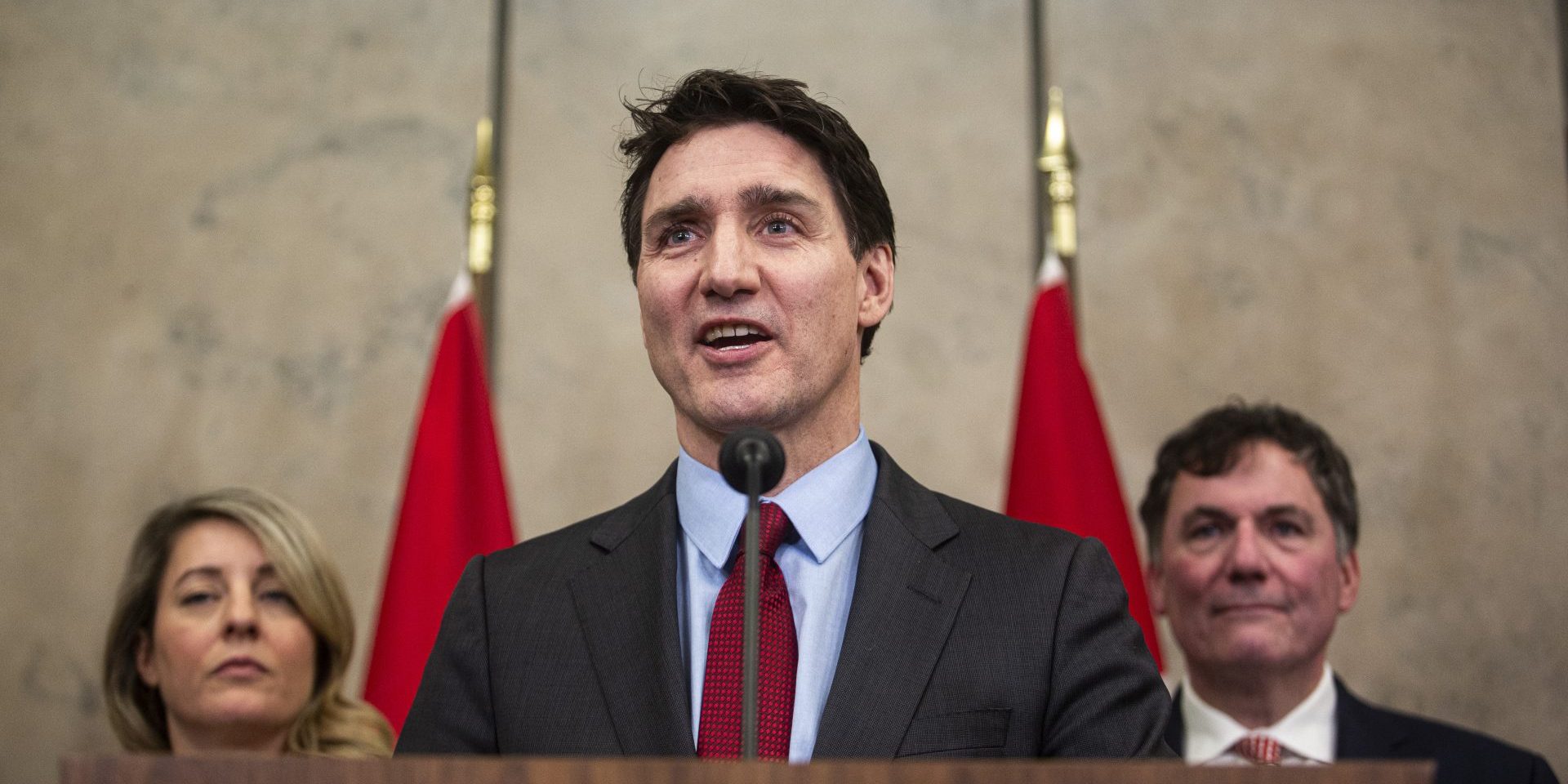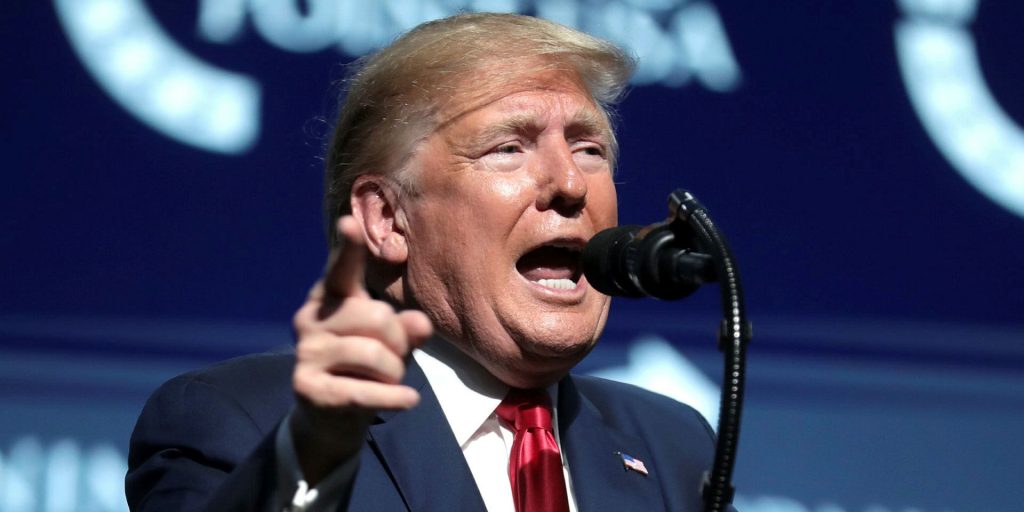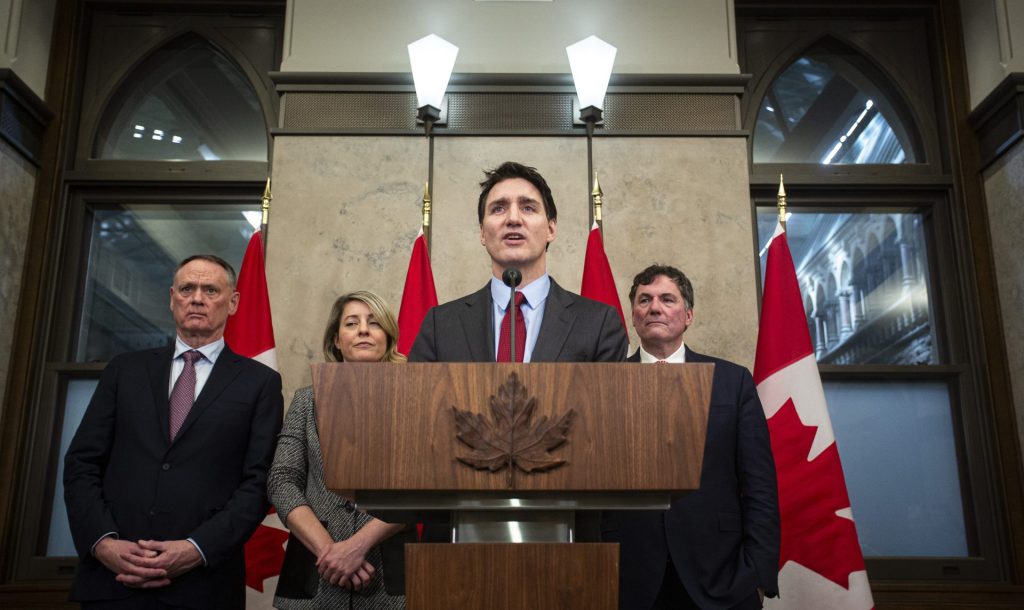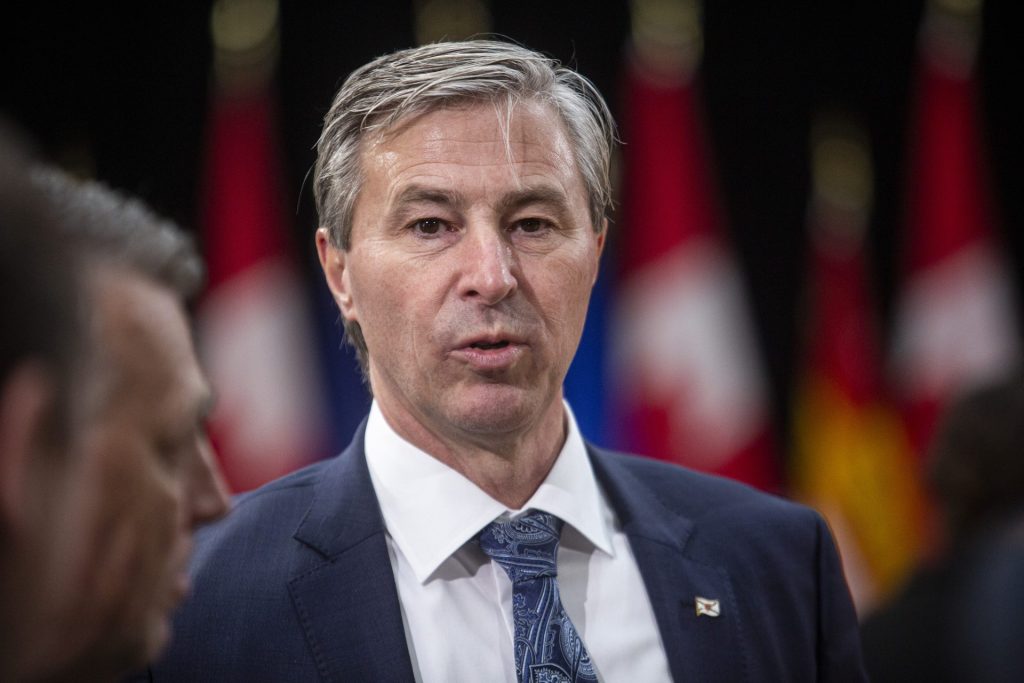Trade war kicks off: Trudeau announces retaliation after Trump makes good on tariff threat

Canada will fight back against tariffs on its exports to the United States, with $155-billion in retaliatory action on American goods, Prime Minister Justin Trudeau announced Feb. 1.
“The coming weeks will be difficult for Canadians, and they’ll be difficult for Americans. The level of co-operation, the level of effective partnerships between our two countries that have been established over decades and generations means that this trade action by the Americans and our response is going to have real consequences, for people, for workers on both sides of our border,” said Trudeau (Papineau, Que.)
“We don’t want to be here. We didn’t ask for this. But we will not back down in standing up both for Canadians, and for the incredible successful relationship and partnership between Canada and the United States.”
On Saturday, U.S. President Donald Trump followed through on his weeks-old threat to impose 25-per-cent tariffs on Canada and Mexico, signing an executive order that would see the action take effect as of Feb. 4. The order specified that the tariff applied to “energy” exports would be set at 10 per cent.
In response, 25-per-cent tariffs on the first $30-billion of American goods will come into effect the same day, said Trudeau, with the tariffs on the remaining $125-billion worth of imports from the U.S. coming into effect in 21 days to allow Canadian companies and supply chains time to find domestic alternatives.
The Canadian response will be “far reaching,” and include American items like beer, wine, bourbon, fruits and fruit juices, vegetables, perfume, clothing, and shoes, Trudeau said. Tariffs will also be applied to “major consumer products like household appliances, furniture, and sports equipment, and materials like lumber and plastics, along with much, much more.”
The federal government, as well as the provinces and territories are also considering non-tariff measures.
The order—entitled “Imposing Duties to Address the Flow of Illicit Drugs Across Our Northern Border”—cited “sustained influx of illicit opioids and other drugs” having “profound consequences” on the U.S., “endangering lives and putting a severe strain on our health-care system, public services, and communities.”
“Canada has played a central role in these challenges, including by failing to devote sufficient attention and resources or meaningfully co-ordinate with United States law enforcement partners to effectively stem the tide of illicit drugs,” the order said, with Trump invoking a previous Jan. 20 declaration of a national emergency as it related to drugs crossing the America’s southern border, and expanding it.
According to U.S. Customs and Border Protection, 43 lbs—19.5 kilograms—of fentanyl was seized at the Canada-U.S. border in 2024, which shot up from two lbs in 2023, and 14 lbs in 2022. In comparison, 21,000 lbs—roughly 9,525 kg—of fentanyl were seized at the U.S.-Mexico border last year, a slight decrease from the 26,700 lbs seized in 2023, and up from the 14,100 lbs in 2022.
Although the order offered an off-ramp for the tariffs if the U.S. deems that the Canadian government “has taken adequate steps to alleviate this public health crisis through co-operative enforcement actions,” Trump warned against retaliation by Canada, with the order stating that the president “may increase or expand in scope the duties imposed under this order to ensure the efficacy of this action.”

When asked about this language in the order, Trudeau said “we will always do what is necessary to defend the interests of Canada,” highlighting the country’s response as “strong, but appropriate.”
The prime minister noted that he has been attempting to speak with Trump since his Jan. 20 inauguration, but hasn’t been successful.
Since Trump first made his tariff threat last November, linking the move to his apparent dissatisfaction with drugs and border security, the Canadian government has moved forward on a variety of measures.
A $1.3-billion border plan announced in December included a new Aerial Intelligence Task Force, with a Black Hawk helicopter that Canadian officials recently showcased to the Americans in video footage. The plan also set out measures to disrupt the fentanyl trade, and committed to speeding up the process to ban precursor chemicals.
The border plan is “already showing results,” which is key because Canada is also “devastated by the scourge that is fentanyl,” Trudeau said.
“As neighbours, we must work collaboratively to fix this. Unfortunately, the action taken today by the White House split us apart instead of bringing us together.”
Trudeau addressed reporters in the West Block alongside Finance and Intergovernmental Affairs Minister Dominic LeBlanc (Beauséjour, N.B.), Foreign Minister Mélanie Joly (Ahuntsic–Cartierville, Que.), and Public Safety Minister David McGuinty (Ottawa South, Ont.) after meeting virtually with the provincial and territorial premiers, and speaking with Mexican President Claudia Sheinbaum.

Bottle rockets
Among the immediate reaction from premiers was a swift indication from some that American booze was no longer welcome on their province’s shelves.
Nova Scotia Premier Tim Houston said his government would be directing the “Nova Scotia Liquor Corporation to remove all alcohol from the United States from their shelves,” as of Feb. 4, in addition to limiting the access of American businesses to provincial procurement.
British Columbia Premier David Eby also announced a booze backlash, targeting alcohol specifically from “red” Republican-run states to be removed from provincial-run B.C. Liquor Stores.

Ontario Premier Doug Ford, who made a pair of American TV appearances on CNN and CBS after the tariffs were handed down, has previously directed the LCBO to clear American alcohol from its stores if tariffs were to go ahead.
Opposition leaders, Grit leadership hopefuls respond
In the wake of the release of Trump’s executive order, Conservative Leader Pierre Poilievre (Carleton, Ont.) released a statement outlining his “Canada First Plan,” that condemned Trump’s “massive, unjust, and unjustified tariffs on Canada’s already weak economy.”
In the statement, Poilievre repeated his push to recall the prorogued Parliament, and move forward with dollar-for-dollar retaliatory tariffs; put any tariff revenue into supporting affected Canadian workers; cut taxes “to bolster the economy, stop inflation, and save and create jobs”; repeal the resource targeted C-69, and “greenlight [liquefied natural gas] plans, pipelines, mines, factories, and port expansions to overseas markets”; knock down interprovincial trade barriers; and further invest in the country’s military. Poilievre has scheduled a press conference for 8 a.m. PT in Vancouver.
In a social media post, NDP Leader Jagmeet Singh (Burnaby South, B.C.) noted that the tariffs “will hurt all of us—and Americans. Now is a time for Canadians to stand strong and stand together. Our values and our solidarity will not crumble in the face of Donald Trump’s economic attack. New Democrats will be there to protect workers. To make sure there is help for everyone impacted by these tariffs.”
Candidates vying to replace Trudeau as the Liberal Party leader and prime minister also weighed on Saturday night.
Former House leader Karina Gould (Burlington, Ont.) issued a statement saying she stands “shoulder to shoulder with those who are working around the clock to protect Canada.” She highlighted buying Canadian goods as a way to support “our fellow citizens through this challenging time,” and that as prime minister, she would “work with [her] provincial and territorial counterparts and business leaders to create a list of products that are made in Canada so that consumers and companies can choose Canadian products.”
Former Bank of Canada governor Mark Carney said tariffs are “a clear violation of our trade agreements and require the most serious trade and economic responses in our history.” He said he supports dollar-for-dollar retaliatory tariffs “aimed where they will be felt the hardest in the United States but will have the least impact in Canada. At the same time, we need a co-ordinated strategy to boost investment and to support our Canadian workers through what will be a difficult moment.”
Former deputy prime minister Chrystia Freeland (University–Rosedale, Ont.) has previously outlined her six-point plan to respond to U.S. tariffs, which included retaliatory tariffs, as well as convening a summit and forming an international coalition with Mexico, Denmark, Panama, and the European Union. She also called for blocking American companies from Canadian federal procurement contracts (with an exception for defence), and all projects funded by the federal government.
“Canada won’t back down to Donald Trump. These tariffs harm the world’s most prosperous trading relationship and one of the great historic friendships between nations,” Freeland posted on Feb. 1. “When it came to fighting for our country, previous generations of Canadians did not back down. We won’t either.”
The Hill Times






 LICENSING
LICENSING PODCAST
PODCAST ALERTS
ALERTS













